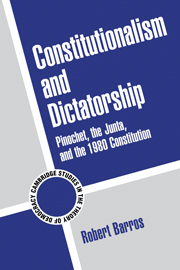Book contents
- Frontmatter
- Contents
- Foreword
- Acknowledgments
- Abbreviations
- Introduction
- 1 Dictatorship, Legality, and Institutional Constraints
- 2 The Constitution of the Exception: Defining the Rules of Military Rule
- 3 The Constitution and the Dictatorship: The Supreme Court and the Constitutionality of Decree-Laws
- 4 The Shadowy Boundary between Force and Law: The Judiciary, Repression, and the Cosmetic Limitation of Emergency Powers
- 5 Constitutionalization without Transition: Prompting the Dual Constitution of 1980
- 6 The Permanent Text: Constitutional Controls or Military Tutelage?
- 7 Even Custom Shoes Bind: Military Rule under the Constitution, 1981–1988
- 8 Military Dictatorship and Constitutionalism in Chile
- References
- Index
5 - Constitutionalization without Transition: Prompting the Dual Constitution of 1980
Published online by Cambridge University Press: 10 December 2009
- Frontmatter
- Contents
- Foreword
- Acknowledgments
- Abbreviations
- Introduction
- 1 Dictatorship, Legality, and Institutional Constraints
- 2 The Constitution of the Exception: Defining the Rules of Military Rule
- 3 The Constitution and the Dictatorship: The Supreme Court and the Constitutionality of Decree-Laws
- 4 The Shadowy Boundary between Force and Law: The Judiciary, Repression, and the Cosmetic Limitation of Emergency Powers
- 5 Constitutionalization without Transition: Prompting the Dual Constitution of 1980
- 6 The Permanent Text: Constitutional Controls or Military Tutelage?
- 7 Even Custom Shoes Bind: Military Rule under the Constitution, 1981–1988
- 8 Military Dictatorship and Constitutionalism in Chile
- References
- Index
Summary
When the members of the Junta decided to promulgate partial constitutional acts – the Actas Constitucionales of 1976 – they inadvertently set in motion a sharp internal debate over institutions and dictatorship that culminated only in 1980 with the promulgation of a constitution. At the outset, the Junta embraced constitutional “self-limitation” as a stratagem to stave off international critics without abdicating power. Nonetheless, the cosmetic manipulation of constitutional forms triggered intense conflicts over the advisability of continued military rule and alternative scenarios of transition. The repercussions of contingent acts, particularly the recoil of the September 1976 car-bomb assassination of Orlando Letelier and Ronni Moffitt in Washington, D.C., and recurring conflicts over the use of dictatorial power further fueled these exchanges. After a drawn-out process, agreement was reached to enact a “definitive” constitution, and in July and early August 1980 the Junta worked out the final text on the basis of proposals drafted by the Constituent Commission and the Consejo de Estado (Council of State), the advisory council created in 1976. The eventual text stipulated the organs and powers that would form a postmilitary “protected” democracy, a timetable and steps for moving to this civilian regime, and the structure of military power during the interim, and was ratified by plebiscite on September 11, 1980 and went into effect six months later.
This chapter analyzes the political dynamics that prompted the promulgation of the 1980 constitution. The following two chapters will examine the substantive content of the constitution and its impact upon military rule and the transition to civilian rule.
- Type
- Chapter
- Information
- Constitutionalism and DictatorshipPinochet, the Junta, and the 1980 Constitution, pp. 167 - 216Publisher: Cambridge University PressPrint publication year: 2002



